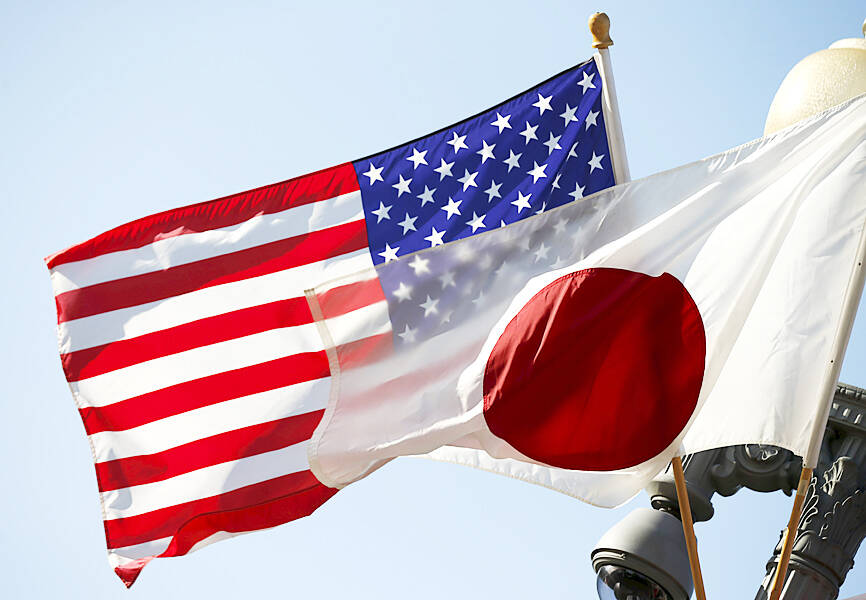The US is contemplating plans to strengthen the functions of the US Forces Japan Headquarters to promote cooperation between the US military and the Japan Self-Defense Forces due to concerns about a potential Taiwan contingency, the Yomiuri Shimbun reported yesterday.
The US government has begun to plan the adjustment to promote interoperability between the militaries of the US and Japan, the newspaper cited multiple Japanese and US government officials as saying.
The changes are to be made in coordination with Japan’s plan to establish a joint headquarters to command its ground, maritime and air forces by the end of March next year, it said.

Photo: Reuters
Japanese Prime Minister Fumio Kishida is scheduled to meet with US President Joe Biden on April 10 for a summit in the US, it said, adding that a joint statement to be issued after the summit might include the plan to adjust the US Forces Japan Headquarters.
“We are in discussion about how our planned joint command can strengthen cooperation with the US and South Korea,” Japanese Chief Cabinet Secretary Yoshimasa Hayashi said yesterday at a regular news conference when asked about the reports.
The agenda for the Biden-Kishida summit has not yet been decided, he added.
The headquarters currently has limited authority regarding the supervision of Japan-US joint exercises and the implementation of the US-Japan Status of Forces Agreement, the Yomiuri Shimbun said.
The US Indo-Pacific Commander, headquartered in Hawaii, has command over the US Navy’s 7th Fleet based in Japan’s Yokosuka and US Marine units based in Okinawa Prefecture, it said.
As China is stepping up its military coercion in East Asia and there are concerns about the possibility of a Taiwan contingency, some are worried that it would be difficult to make timely responses under the current system, which requires coordination between Tokyo and Hawaii due to the time difference, it said.
The adjustment under discussion aims to expand the authority of the US Forces Japan Headquarters without taking away the command authority of the US Indo-Pacific Commander, it said.
There is a proposal to give the Tokyo headquarters authority to plan joint Japan-US exercises and training, as well as to work with the joint headquarters that is to be launched next year on coordination, information sharing and distribution of materials, it said.
Another possible arrangement is to establish a permanent joint team in Japan to ensure closer coordination between the Japan Self-Defense Forces and US forces in Japan, it said.
Unlike in Japan, US troops based in South Korea and the South’s military are under a single command authority, it added.
Additional reporting by Reuters

MAKING WAVES: China’s maritime militia could become a nontraditional threat in war, clogging up shipping lanes to prevent US or Japanese intervention, a report said About 1,900 Chinese ships flying flags of convenience and fishing vessels that participated in China’s military exercises around Taiwan last month and in January last year have been listed for monitoring, Coast Guard Administration (CGA) Deputy Director-General Hsieh Ching-chin (謝慶欽) said yesterday. Following amendments to the Commercial Port Act (商港法) and the Law of Ships (船舶法) last month, the CGA can designate possible berthing areas or deny ports of call for vessels suspected of loitering around areas where undersea cables can be accessed, Oceans Affairs Council Minister Kuan Bi-ling (管碧玲) said. The list of suspected ships, originally 300, had risen to about

DAREDEVIL: Honnold said it had always been a dream of his to climb Taipei 101, while a Netflix producer said the skyscraper was ‘a real icon of this country’ US climber Alex Honnold yesterday took on Taiwan’s tallest building, becoming the first person to scale Taipei 101 without a rope, harness or safety net. Hundreds of spectators gathered at the base of the 101-story skyscraper to watch Honnold, 40, embark on his daredevil feat, which was also broadcast live on Netflix. Dressed in a red T-shirt and yellow custom-made climbing shoes, Honnold swiftly moved up the southeast face of the glass and steel building. At one point, he stepped onto a platform midway up to wave down at fans and onlookers who were taking photos. People watching from inside

Japan’s strategic alliance with the US would collapse if Tokyo were to turn away from a conflict in Taiwan, Japanese Prime Minister Sanae Takaichi said yesterday, but distanced herself from previous comments that suggested a possible military response in such an event. Takaichi expressed her latest views on a nationally broadcast TV program late on Monday, where an opposition party leader criticized her for igniting tensions with China with the earlier remarks. Ties between Japan and China have sunk to the worst level in years after Takaichi said in November that a hypothetical Chinese attack on Taiwan could bring about a Japanese

The WHO ignored early COVID-19 warnings from Taiwan, US Deputy Secretary of Health and Human Services Jim O’Neill said on Friday, as part of justification for Washington withdrawing from the global health body. US Secretary of State Marco Rubio on Thursday said that the US was pulling out of the UN agency, as it failed to fulfill its responsibilities during the COVID-19 pandemic. The WHO “ignored early COVID warnings from Taiwan in 2019 by pretending Taiwan did not exist, O’Neill wrote on X on Friday, Taiwan time. “It ignored rigorous science and promoted lockdowns.” The US will “continue international coordination on infectious